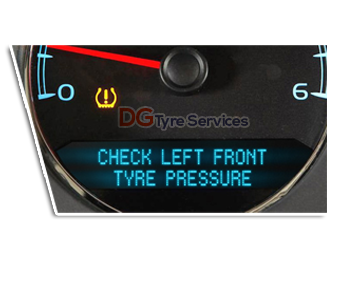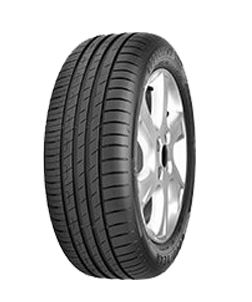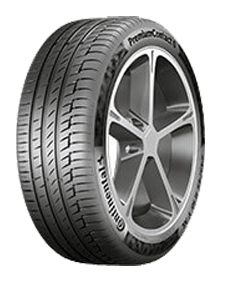TPMS Services
Our Tyre Pressure Monitoring Systems continuously monitor tyre air pressure.
Open 24 hours - Get a Quote
Tyre Pressure Monitoring Systems (TPMS)
If your tyre pressure drops more than 20% below manufacturer-recommended levels, the system will alert you with a visual and/or audible warning inside your car.
A flashing TPMS light on your dash indicates a problem and could mean a broken sensor – something we can easily fix. A static (not flashing) light indicates that one of your tyres has low pressure and may need repairing or replacing. Again, etyres can help you with this.
Why choose DG Tyre Sevices ?
At DG Tyres we understand TPMS. We offer an easy, convenient mobile service to replace your broken sensors for a genuinely low price. We care about getting you and your family swiftly and safely back on the road. That's why we have designed our expert TPMS sensor replacement service to be as efficient and cost-effective as possible, saving you time, hassle and money. All our sensor prices are fully inclusive of fitting, programming and VAT.Furthermore, as galvanic corrosion – caused by the use of brass valve cores inside an aluminium stem – is a common cause of sensor failure, etyres only ever fit higher-quality, nickel plated valve cores.
TPMS sensors & servicing
How much will a new sensor cost?etyres will fit and programme a new TPMS sensor for only £69 (incl. VAT).
How much will servicing cost?
To prolong the life of your sensors, we recommend having them serviced when you change your tyres. We can replace important components, including the TPMS core, rubber grommet and valve retaining nut, so they continue to provide an air-tight seal.
Our sensor service kits start from £9.90.
Get in touch today on t: 02392 655777
Why do sensors need replacing or servicing?
Sensor batteries last for around 5-7 years or approximately 100,000 miles. The batteries are irreplaceable, so when they fail, a new sensor is required. Sensors may need replacing sooner if the tyres have been underinflated for a long time.
Furthermore, without servicing, TPMS sensors are prone to corrosion. Having your sensors serviced (replacing important components if necessary) when you have new tyres fitted means you can avoid the expense of prematurely replacing a sensor.
Get in touch today on t: 02392 655777
Benefits of TPMS
The primary function of TPMS is safety. Underinflated tyres cause most tyre blowouts; TPMS technology reduces the risk of this by quickly alerting you to potentially dangerous changes in tyre pressure.
The continuous monitoring of tyre pressure also simplifies tyre maintenance and saves drivers hassle. It can be easy to forget to check your tyre pressures, which makes TPMS invaluable for providing additional safety.
In addition to improving safety, TPMS can save you money by improving fuel efficiency and prolonging tyre life. This, in turn, has the added benefit of being kinder to the environment.
Get in touch today on t: 02392 655777
A quick guide to finding the correct Tyres
-

CAR TYRES - We come to you at home or work to fit your tyres. You can order online or if you prefer you can speak with one of our advisors on 02392 655777.
We know that the most important factors when it comes to replacing your car tyres are value for money and convenience.
As the UK’s leading mobile tyre retailer we offer a range of good quality economy tyres as well as premium brands including Michelin, Continental, Pirelli and Bridgestone. To help you choose the correct tyres we have classified them into three categories: premium; mid-range; economy. -

VAN WINTER TYRES - Tyres fitted to vans and commercial vehicles should be checked regularly for signs or wear or damage. However, fitting winter tyres is an essential measure in keeping working vehicles on the road and working safely whatever the weather. For some years now, large fleet operators like utility companies, delivery firms and supermarkets have made a point of fitting winter tyres to all their vehicles from October to April.
Winter tyres bring increased safety in all winter conditions, not solely on ice and snow. The costs involved are minimal, far less than the costs to any business of not being able to keep vehicles running in bad weather. Additionally, the mobile fitting service of DG Tyre Services means that there’s no inconvenience or lost time involved in switching from summer to winter tyres, either.
DG Tyre Services recommends the use of winter tyres and we fit them to our own extensive fleet of vans every year. They are available in sizes to fit all vehicles and in the reinforced versions needed to support the higher load ratings and weightbearing specifications of vans and commercial vehicles.
Winter tyres for vans have been designed with durability in mind. The tread block design and tread patterns of many van winter tyres ensure exceptional tyre life. For more information on the technology behind winter tyres for vans click here.
Keeping both drivers and fleet vehicles safe, mobile and reliable is important for countless business all year round. Running vans with summer tyres in winter conditions can mean that customers are let down, deadlines missed and money lost, quite apart from the safety implications for both vehicles and staff. It’s important to fit winter tyres when average temperatures fall, not solely when Britain grinds to a halt as the first snow starts to fall. Contact DG Tyres Today -

4x4 TYRES - In recent years the market for 4×4 tyres has expanded to become the fastest growing sector of new vehicle registrations, in 2002 the demand for 4×4 tyres was 250% of that for 1997. Gone are the days when a 4×4 vehicle meant driving an ex-army vehicle with no heaters / wipers / performance etc. Today’s 4×4 vehicles are some of the most sophisticated on the road.
Even manufacturers that many years ago may not have considered a 4×4 vehicle in their model line-up are selling as many as they can build – BMW X3 and X5, Porsche Cayenne to name but a few. Most of these “new generation” 4×4’s come equipped with equipment such as cruise control, climate control, active suspension (to name but a few) as standard. Probably the biggest improvement is to be seen in the vehicle performance – for instance the Porsche Cayenne Turbo puts out 450bhp with 620 nm of torque, and will easily outperform the vast majority of cars of the road.
To cope with the extra power and performance of these new vehicles, 4×4 tyre requirements have changed dramatically. In the past most 4×4 vehicles were equipped with either 15″ or 16″ wheels and fitted standard (80 series) or possible 70 series tyres with either “S” (113mph) or “T” (118mph) speed rated tyres. Again if we take the Porsche Cayenne Turbo as an example the standard wheels fitted are 8Jx18 with 255/55R18 Y rated (186mph) tyres. Again with these vehicles there is always the option to upgrade wheel and tyres to 20″ or even 22″ and above.





